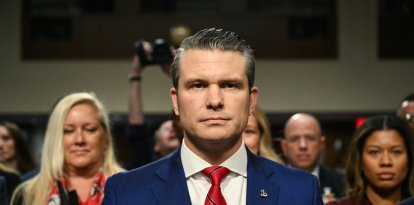Biden administration approves $623 million subsidy for electric vehicle charging stations
The Democratic government's investment occurs despite the fact that 63% of Americans say they would not buy an EV.

(Marco BELLO / AFP)
Joe Biden's government announced that it is allocating $623 million to install charging stations for electric vehicles. The information was posted by Transportation Secretary Pete Buttigieg on X, formerly Twitter.
"Pleased to announce $623M in grants from DOT's Charging and Fueling Infrastructure Program to continue building the EV charging network across the country," Buttigieg wrote.
The department's intention is to continue with the Democratic government's policy of promoting the use of electric vehicles in the country. "This will help drive a made-in-America EV revolution, making it more affordable & convenient to charge no matter where you live and work," Buttigieg said.
The budget, as explained by the Department of Transportation, will finance 47 charging and alternative fuel infrastructure projects for electric vehicles in 22 states and Puerto Rico. It aims to build approximately 7,500 electric vehicle charging stations.
"The CFI program complements the $5 billion National Electric Vehicle Infrastructure (NEVI) formula program to build the 'backbone' of high-speed EV chargers along our nation’s highways. Thanks to the NEVI program, new charging stations in Ohio and New York have opened, and states like Pennsylvania and Maine have broken ground," the DOT said.
The department also maintained that under the Biden administration, sales of electric vehicles "have more than quadrupled, the number of publicly available charging ports has grown by nearly 70 percent, and more than 4 million EVs are now on the road."
Distrust in electric vehicles
The decision from the Democratic government comes at a time when there have been warnings about problems in the electric vehicle industry. On Thursday, rental car company Hertz announced that it would be selling 20,000 electric vehicles available from its subsidiary in the United States. The company highlighted that the costs resulting from crashes and accidents are too high compared to gas-powered cars.
This is not the only problem that occurs with electric cars. A Consumer Reports survey showed that electric vehicles are less "reliable" than those with traditional gasoline engines.
The survey, which indicates which vehicle brands are most reliable for drivers, revealed that owners of electric cars reported 79% more problems with their cars than those that run on gasoline engines (manufactured from 2000 to 2023). The figure increases to 146% more problems for plug-in hybrid cars. However, the hybrid models that do not require charging have 26% fewer problems than the combustion version.
These data are reflected in the opinions of drivers (who mostly disapprove of electric vehicles). Sixty-three percent of Americans said they would not buy an electric car, according to a Pew Research Center survey. Half of adults said they will not consider or are unlikely to consider purchasing an electric car in the future. Another 13% stated directly that they do not plan to acquire one.
Meanwhile, Akio Toyoda, president of Toyota, declared that people are "finally seeing the reality" that comes with the use of electric vehicles. The CEO of the company pointed out that the decline in sales demonstrates the reluctance of citizens to adapt to this new but still flawed technology.
The Biden administration's insistence
Despite the information, Joe Biden's government insists on promoting the use of electric cars. In December, the administration published guidance requiring White House officials to prioritize the use of electric vehicles over combustion vehicles.
"President Biden’s Federal Sustainability Plan aims to reach net-zero emissions from overall Federal operations by 2050, including a 65 percent emissions reduction by 2030. Through new Federal employee travel guidelines issued today, the Biden-Harris Administration is advancing this goal by directing Federal agencies to prioritize the use of sustainable transportation for official and local travel, both domestically and internationally," said the White House in a statement published on its official website.
The guidelines explained that workers should "prioritize the use of electric vehicles when traveling: federal employees will rent an electric vehicle on official trips when the cost is less than or equal to the most affordable comparable vehicle available. Employees will also opt for cost-competitive electric vehicle options, where available, when using taxis and ride-sharing platforms."
RECOMMENDATION





















